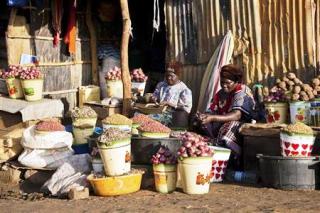Juba holds emergency cabinet meeting over worsening economic situation
January 26, 2016 (JUBA) – South Sudanese cabinet held an emergency cabinet meeting on Tuesday to discuss a wide range of economic and security matters as part of an attempt to explore ways to address the rapidly growing crimes rate and killing of senior officials by unknown gunmen as well as skyrocketing consumer prices in the capital, Juba, and across the country.

Cabinet affairs minister, Martin Elia Lomuro, told reporters on Tuesday that”People should understand that we can reach a solution yet this requires a great amount of patience and positivism.”
He blamed others for what he described as many dark ideologies taking advantage of the dire situation and the enthusiasm of many youth.
“Many enemies do not wish to see our country and our people to be a successful nation. They feel undermined by the resilience of our people. They are doing all they can to disturb the harmony of our peace and the historic stance and support our people have continued to show to their government because this is the government they elected. The coming of peace is inevitable. The transition is irreversible,” he said.
More than half of the entire population of the country go hungry and are demanding immediate action against unemployment and poor economic conditions.
Many citizens argue that they voted in the 2011 referendum because they had hoped that the government of independent new state would tackle corruption, poverty and offer job opportunities for almost a million unemployed South Sudanese.
But government supporters have been keen to push the blame on politicians whom they claimed did not exhibit patience by allegedly wanting to grab power through violent means as a way to change the government.
Observers say they do not know how the government would handle the situation after failing to form the transitional government of national unity which many hope would get support from the international community as the current government does not have the funds and the capabilities to tackle many of the issues, including institutional reforms.
They observe that the situation is going to be an extremely delicate situation for the political elite in the near future.
Finance Minister David Deng Athorbei however told reporters on Tuesday that the government would put a programme in place to try to ease economic situation.
(ST)
